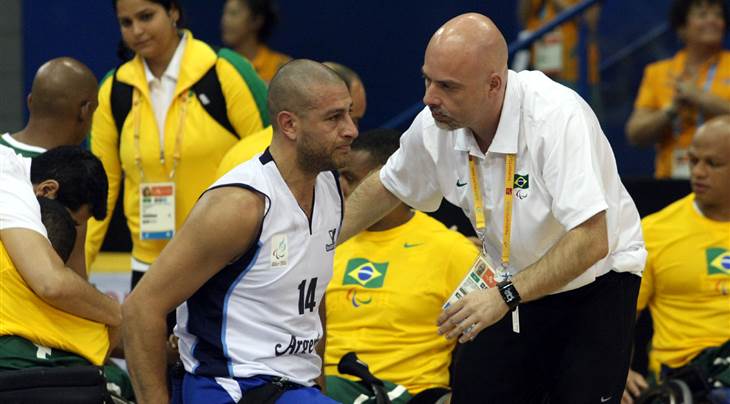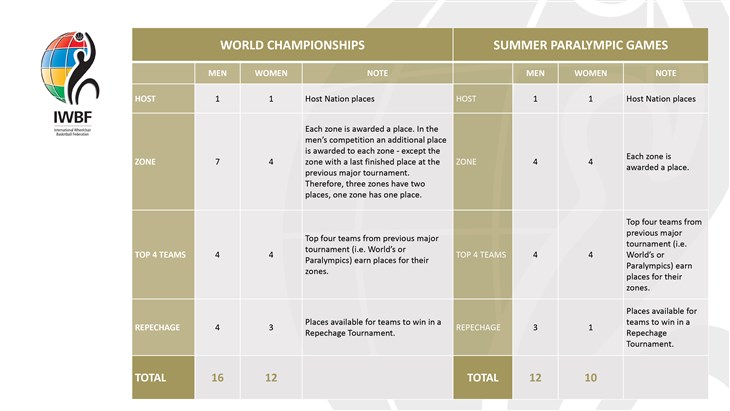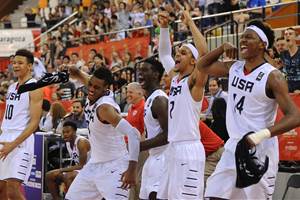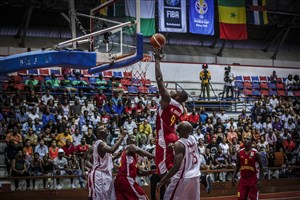
So you're saying there's a chance - IWBF tweaks Paralympic and World Championship Qualifying
CHARLOTTE (Steve Goldberg's Wheel World) - In the effort to make things more interesting, the IWBF has followed FIBA in updating the qualification process for the federation's major championships.
While not as seismic as FIBA's new home and away format for the FIBA Basketball World Cup Qualifying that give every participating national team games of substance at home, the IWBF announced a second-chance method for teams who do not gain invitation through the zonal championships. It would start in 2019, presumably off the results from the World Championships in Hamburg this summer.
Traditionally, besides being the host nation, those zonal tournaments were the alpha and omega when it came to playing in the big events.

If you didn't perform there, or if a key player or two were injured or playing poorly for that one tournament, it could be catastrophic. Case in point: Canada's men, who never missed a major tournament, played terribly in the 2013 Americas tournament and couldn't purchase a ticket to the 2014 World Championship in Incheon.
And, if your zonal compatriots didn't do well enough in a World Championship, the slots wouldn't be there for the next Paralympics. Without Canada there, the Americas zone lost the usually reliable chance for another Paralympic slot in Rio, which cost Argentina, even though they finished third at the 2015 Parapan American Games in Toronto. That was also the problem for Australia's women, because the inclusion of a women's team from Africa for the first time, ended up limiting the options for the Asia-Oceania Zone.
That in itself was not the impetus for the change, IWBF Secretary General Maureen Orchard told me.
More so, it was, "a desire to meet our commitment to have global representation – thus the automatic spots for ones while recognizing that some zones are stronger than others at this time and we needed to find a way to recognize this."
"We have been looking to increase marketing opportunities for IWBF and member nations, and the 'repechage' tournament supports this objective. The logistics for the organisation of the competition in 2019/2020 are being developed, but we are sure that this opportunity will be very popular."Maureen Orchard, IWBF Secretary General
What that means is that the new system would retain much of what currently exists. Host nations will still be automatic. Performance in the Paralympic Games and World Championship will still dictate slot allocation for the next event, just not all of them. The top four teams from each event will earn zone spots for the next event.
From there it diverges a bit given the different number of participating teams in the Paralympics (12 men's, 10 women's) and World Championships (16, 12).
The flexibility will come from holding slots out for what is currently called a "repechage" or second chance tournament. The top two teams that did not qualify from a zonal championship would be eligible to compete.
The final details such as where-when-how are yet to be hammered out. In fact, the determination to go this way is not totally ordained. Orchard said, "While the Executive Committee has the authority to make the change we have decided that such a major change will be presented to the Congress (to be held in Hamburg). While we expect their support of this direction they can of course raise it at the Congress for review.
The new format didn't just happen.
"We have been looking to make changes for some time now," said Orchard. "With the change in 2014 to a 16 team men’s division at Worlds we had the experience of dealing with the old system and the new numbers and decided maybe it was time for a change. Since we did not want to change in the middle of a competition cycle (2014-2018) we made the decision to put the new system in place for the next cycle 2018-2022."
"We see this as a way to provide a second opportunity to nations that were not successful through their Zone qualification tournament to try to qualify."
Who doesn't like a second chance.
FIBA
FIBA's columnists write on a wide range of topics relating to basketball that are of interest to them. The opinions they express are their own and in no way reflect those of FIBA.
FIBA takes no responsibility and gives no guarantees, warranties or representations, implied or otherwise, for the content or accuracy of the content and opinion expressed in the above article.
To help make this column as inclusive as possible, please send any national or international event information, story suggestions, or comments to wheelworldmail@gmail.com.

















